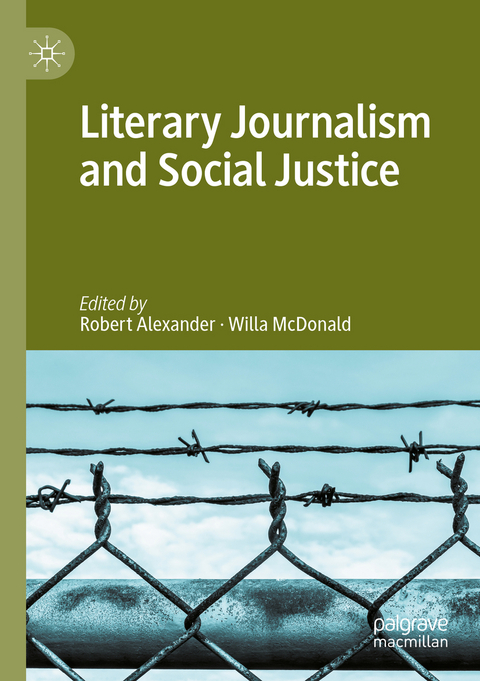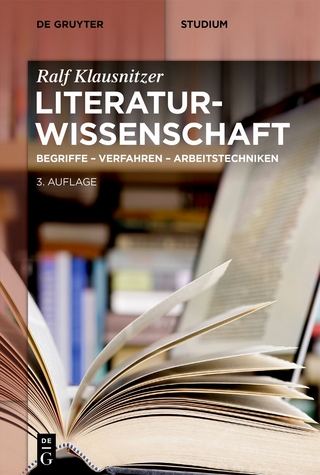
Literary Journalism and Social Justice
Springer International Publishing (Verlag)
978-3-030-89422-1 (ISBN)
lt;p>Robert Alexander is Associate Professor of English at Brock University, Canada. He is the co-editor of Fear and Loathing Worldwide: Gonzo Journalism Beyond Hunter S. Thompson (2018).
Willa McDonald is Senior Lecturer in Media at Macquarie University, Australia, where she teaches and researches narrative journalism. Her books include Warrior for Peace: Dorothy Auchterlonie Green (2009) and the co-edited The Writer's Reader (2007).
Chapter 1 - Introduction (Robert Alexander & Willa McDonald).- 1 - Historical Beginnings: Literary Journalism, Witnessing and Epistemic Justice.- Chapter 2 - The Reporter as Medium: The Theorization of Self-reflection as a Function in Social Reportage (Pascal Sigg, PhD student at University of Zurich).- Chapter 3 - Literary Journalism and Social Justice in the US Antebellum Period (Nancy Roberts, Professor at University at Albany-SUNY).- 2 - Literary Journalist as Social Justice Activist.- Chapter 4 - Down But Not Out: Orwell's 'Spike' and Journalism as a Way of Living (Richard Keeble, Professor at University of Lincoln).- Chapter 5 - Rodolfo Walsh: The Quest for Social Justice Beyond Law(lessness) (Pablo Calvi, Assistant Professor at Stony Brook University School of Journalism).- Chapter 6 - "The Personal Bleeds into the Political": The Literary Journalism of India's Dalit Protest Movement (David O. Dowling, Associate Professor at University of Iowa).- 3 - Migration, Displacement and Carceral Justice.- Chapter 7 - Literary Journalism as a Vehicle for Mobility Justice: The Case of Every Day We Live is the Future (2017) (Rob Alexander).- Chapter 8 - The Global Language of Contemporary Literary Journalism: Transatlantic Views of Social (In)Justice in the Works of Gabriel Thompson and Rui Simões (Isabel Soares, Associate Professor; Rita Amorim, Assistant Professor; Raquel Baltazar, Assistant Professor, all Universidade de Lisboa).- Chapter 9 - Social Justice and Literary Journalism in Behrouz Boochani's No Friend but the Mountains (Willa McDonald).- Chapter 10 - The Literary Journalism of the Prison Press (Kate McQueen, University of California Santa Cruz).- 4 - Race, Gender and the Witnessing of Trauma: Testimonial and Deliberative Justice.- Chapter 11 - Matter of Access: The Role of Black Journalists in Covering Emmett Till (Roberta S. Maguire, Professor at University of Wisconsin Oshkosh).- Chapter 12 - Phronetic Journalism: Ethics Empathy and Change in Melissa Davey's 'I feel mutilated' (Jennnifer Martin, Lecturer at Deakin University).- Chapter 13 - Standpoint Theory and Trauma: Giving Voice to the Voiceless (Sue Joseph, Senior Lecturer at University of Technology Sydney).- 5 - Environmental, Ecological and Indigenous Justice.- Chapter 14 - Joan Baxter's The Mill: Bearing Witness to Environmental and Epistemic Justice (Callie Long, PhD candidate at Brock University).- Chapter 15 - Rights to Territory, Identity and Environmental Challenges in Latin American Literary Journalism (Dolors Paula-Sampio, Senior Lecturer at University of Valencia).- Chapter 16 - From Silent Spring to Standing Rock: Environmental Justice, New Media and Oral Traditions (Ryan Marnane, Lecturer at Bryant University).- 6 - Literary Journalism Form and Social Justice.- Chapter 17 - Literary Reportage of an Empathetic Eyewitness and an Activist Rebel: Bostjan Videmsek and his Dispatches from the Frontlines of Humanity (Leonora Flis, Associate Prfoessor at University of Nova Gorica and University of Ljubljana).- Chapter 18 - American Literary Journalism as Liberatory Pracix: Experimentalism and Social Justice (William Dow, Professor at The American University of Paris).- 7 - Teaching Literary Journalism as a Tool for Social Change.- Chapter 19 - Stories, Students and Social Justice: Literary Journalism as a Teaching Tool for Change (Jeffrey Neely, Associate Professor at the University of Tampa; Mitzi Lewis, Associate Professor at MSU Texas).
| Erscheinungsdatum | 06.08.2023 |
|---|---|
| Zusatzinfo | XVII, 326 p. 1 illus. |
| Verlagsort | Cham |
| Sprache | englisch |
| Maße | 148 x 210 mm |
| Gewicht | 450 g |
| Themenwelt | Geisteswissenschaften ► Sprach- / Literaturwissenschaft ► Literaturwissenschaft |
| Sozialwissenschaften ► Kommunikation / Medien ► Journalistik | |
| Sozialwissenschaften ► Kommunikation / Medien ► Kommunikationswissenschaft | |
| Schlagworte | environmental journalism • epistemic justice • Literary Journalism • long-form • Narrative Journalism • Reportage • Social Justice • testimonial justice • witnessing |
| ISBN-10 | 3-030-89422-3 / 3030894223 |
| ISBN-13 | 978-3-030-89422-1 / 9783030894221 |
| Zustand | Neuware |
| Informationen gemäß Produktsicherheitsverordnung (GPSR) | |
| Haben Sie eine Frage zum Produkt? |
aus dem Bereich


